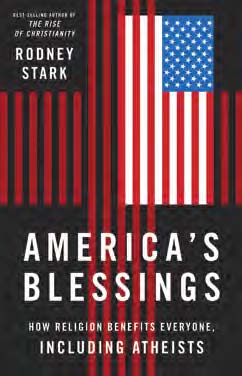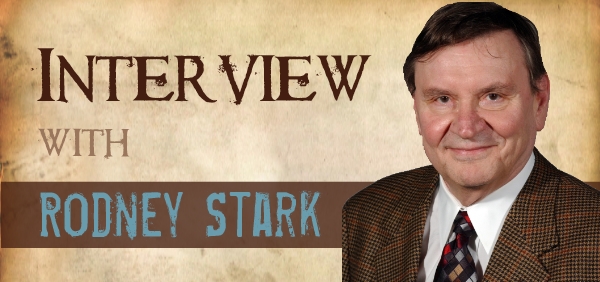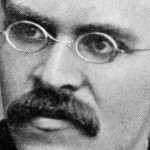How Religion Benefits Everyone: An Interview with Rodney Stark
by Brandon Vogt
Filed under Interviews, Religion
Rodney Stark is one of the leading authorities on the sociology of religion. For many years, the Pulitzer Prize nominee was professor of sociology and professor of comparative religion at the University of Washington. In 2004 he became Distinguished Professor of the Social Sciences and codirector of the Institute for Studies of Religion at Baylor University. He has authored more than 150 scholarly articles and 32 books, including several widely used sociology textbooks and best-selling titles like The Triumph of Christianity: How the Jesus Movement Became the World’s Largest Religion, God’s Battalions: The Case for the Crusades, and The Victory of Reason: How Christianity Led to Freedom, Capitalism, and Western Success.
 His most recent book, America's Blessings: How Religion Benefits Everyone, Including Atheists (Templeton Press), looks at the measurable effects of religious faith and practice on American society.
His most recent book, America's Blessings: How Religion Benefits Everyone, Including Atheists (Templeton Press), looks at the measurable effects of religious faith and practice on American society.
Starting with a historical overview, Stark traces America’s religious roots from the founding of the country up through the present day, showing that religiosity in America has never been consistent, static, or monolithic. Interestingly, he finds that religious practice is now more prevalent than ever in America, despite any claims to the contrary.
From here, Stark devotes whole chapters to unpacking the latest research on how religion affects different facets of modern American life, including crime, family life, sexuality, mental and physical health, sophistication, charity, and overall prosperity. The cumulative effect is that when translated into comparisons with western European nations, the United States comes out on top again and again. Thanks in no small part to America’s rich religious culture, the nation has far lower crime rates, much higher levels of charitable giving, better health, stronger marriages, and less suicide, to note only a few of the benefits.
Despite the increasing outcry against religion, the remarkable conclusion is clear: all Americans, from the most religious among us to our secular neighbors, really ought to count our blessings.
Rodney recently sat down with me to discuss the new book including the rise of the "nones", the state of American atheism, and how religion saves the country over $2.6 trillion each year.
Q: In America's Blessings, you note two seemingly contradictory facts. First, about 20% of Americans claim no religious affiliation. Second, these "nones" are also deeply religious. What are some characteristics of this rising group and how do they affect the religious landscape?
Rodney Stark: I am not sure their percentage of the population has actually been increasing. As the number of “nones” found by surveys has increased, so too the completion rate of surveys has decreased. The completion rate is the percentage of those drawn in the original sample who are interviewed.
Years ago, all good surveys had completion rates in excess of 85 percent. Several years ago many surveys had completion rates of only around a third. Most recently it has fallen to close to 10 percent. It is well-known that those who still participate in surveys are quite different from those who do not participate—they are less affluent and less educated. Contrary to the popular wisdom, more affluent and better educated people are more likely to belong to a local church. Hence, the bias in completion rates easily could account for the rise in the percent who say they have “no religion.”
Indeed, these people are not really saying they have no religion, but merely that they have no church membership. That is very different and is consistent with the fact that the majority of them are quite religious in terms of belief, prayer, and the like.
Q: What is the atheist demographic like in America. Has it risen in past decades and is it growing today?
Rodney Stark: In 1944, the Gallup Poll asked a national sample of Americans if they believed in God. Four percent said “no.” Since then the question has often been asked and the percent of atheists has held steady at about four percent and never exceeding six percent.
Q: After examining hundreds of relevant studies, what's the biggest misconception you've found about the typical religious believer?
Rodney Stark: Even some leading evangelical scholars take it for granted that religious Americans are lacking in appreciation for “high culture,” for music, art, literature, and the like. Nothing could be further from the truth. The more often Americans attend religious services, the more likely they are to read newspapers, poetry, novels, and to admire writers. The same applies to liking classical music, to attending symphony concerts, operas, and stage plays, and to dislike rock ‘n roll.
Q: Some recent books, like Christopher Hitchens' God Is Not Great, suggest that "religion poisons everything." But your book indicates that religious belief offers society many tangible benefits. What are some of these benefits?
Rodney Stark: Religious Americans are more law abiding, have superior mental and physical health, are far more generous vis-à-vis charities, have much better family life, are more successful, and religious couples even have more satisfactory sex lives!
Q: In the book's Conclusion you look at religion's effect on many areas of society—crime, schooling, health, employment, welfare—and you determine that, by a conservative estimate, religion saves America over $2.6 trillion each year. What are some of the biggest contributors to this savings?
Rodney Stark: The biggest by far has to do with the criminal justice system. If all Americans committed crimes at the same level as those who do not attend religious services, the costs of the criminal justice system would about double to, perhaps, $2 trillion annually. Second is health costs. The more often people attend religious services, the healthier they are. However, the net savings involved is reduced somewhat by the fact that religious Americans live, on average, seven years longer than those who never attend religious services.

 A few years ago, a debate between atheists and religious believers spilled out from the halls of academia and the pews of America’s churches and into the public spotlight. As both sides exchanged spirited volleys, accusations were leveled; myths, stereotypes, and strawmen arguments were perpetuated; and bitter hostility filled the air. Today many of these misconceptions and myths linger on, along with the generally acrimonious spirit of the debate.
A few years ago, a debate between atheists and religious believers spilled out from the halls of academia and the pews of America’s churches and into the public spotlight. As both sides exchanged spirited volleys, accusations were leveled; myths, stereotypes, and strawmen arguments were perpetuated; and bitter hostility filled the air. Today many of these misconceptions and myths linger on, along with the generally acrimonious spirit of the debate.
In America’s Blessings, distinguished researcher Rodney Stark seeks to clear the air of this hostility and debunk many of the debate’s most widely perpetuated misconceptions by drawing from an expansive pool of sociological findings. Looking at the measurable effects of religious faith and practice on American society, Stark rises above the fray and focuses exclusively on facts. His findings may surprise many, atheists and believers alike.
Related Posts
Note: Our goal is to cultivate serious and respectful dialogue. While it's OK to disagree—even encouraged!—any snarky, offensive, or off-topic comments will be deleted. Before commenting please read the Commenting Rules and Tips. If you're having trouble commenting, read the Commenting Instructions.












